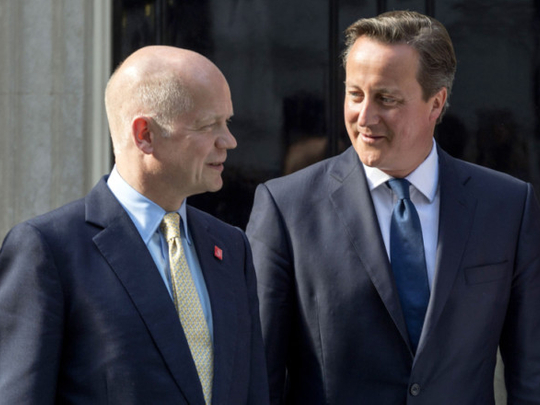
Britain is an island that has lost its moorings. What it needs is a foreign policy. Not another vainglorious attempt to reclaim lost grandeur, but a measured strategy to mark out its place in a different world. Britain’s national interests are international and, for all the tumultuous shifts in the global order, it still has something useful to say. Instead it has chosen drift.
David Cameron’s latest troubles in Europe are symptom not cause. Radoslaw Sikorski’s disobliging reflections on the prime minister’s approach were revealing. The Polish foreign minister is an anglophile and, like Cameron, an alumnus of Oxford’s raucous Bullingdon Club. Sikorski’s expletive-laden description of British posturing in Brussels captured a truth. How is it that Britain has become so adept at organising its own defeats? The spreading Euro-scepticism in the Tory party dealt Cameron a difficult hand. He has played it with insouciant incompetence.
Not so long ago Britain was the champion of the EU’s admission of the former communist states of eastern and central Europe. John Major, another Conservative prime minister harried by Euro-sceptics, crafted a policy of enlightened self-interest. The spread eastward of prosperity and democracy was good for everyone; and the new members, with their liberal and Atlanticist outlook, would provide a useful counterpoint to dirigiste France.
The friendships have been thrown away. The government has demonised hard-working Polish plumbers and Lithuanian fruit-pickers as “benefit tourists” intent on stealing the jobs and plundering the wallets of British workers. Major helped these countries into the EU; Cameron has played to a populist gallery that wants to lock them out. All the while Britain has chipped away at its own worth as an ally. Why should Poles, Czechs or Baltic nations align themselves with a nation heading towards EU exit?
The government was relying on Germany’s Angela Merkel to ride to the rescue. Instead, the confrontation about Jean-Claude Juncker’s candidacy to head the European Commission has marked out the limits of the chancellor’s support. She sorely wants Britain to stay in the club, but not at any price.
There will not be any winners if the ill-suited Juncker is confirmed in the job; nor if he takes up the ideas of the French government that the commission spend the next five years imposing an EU-wide minimum wage, a uniform corporate tax rate and a protectionist industrial strategy while reopening the terms for a transatlantic trade deal. Cameron, though, is the big loser.
Britain is not alone in its foreign policy confusion. Germany is at last waking up to the reality that Russia’s Vladimir Putin does not play by cuddly European rules. They are laughing in the Kremlin at Berlin’s stuttering response to the annexation of Crimea. France, which, like Britain, once strode a global stage, has been taken hostage by economic weakness and a failure of political nerve. Nowadays it plays second fiddle to Matteo Renzi’s Italy. That hurts, even if Italy’s foreign policy sometimes seems to consist of offering excuses for Putin.
Each of these nations, though, has a European compass. In other circumstances, Britain might have looked to the US to balance a falling out with in Europe. No longer. Cameron gets on well enough with Barack Obama. but the two leaders often talk past each other.
Some British politicians blame the Obama administration. The US, they say, is pulling back from its global role. There is substantial truth in this. One of the abiding themes of today’s geopolitics is the US retreat from influence. The tougher reality is that, from Washington’s vantage point, a Britain estranged from its own continent is a far less useful friend. The US worries that the looming Scottish referendum could herald the break-up of the UK. Obama has turned to Berlin as the centre of Europe’s gravity.
From the outside, Britain’s Foreign Office looks as weak as it has ever been. When the Russians marched into Crimea, the government was caught off-guard. It turned out that the Foreign Office had downgraded and depleted its Moscow desk. The diplomatic initiative fell to the Weimar triangle of Germany, France and Poland. Britain still has some of the smartest diplomats around, but they only can be as good as their political direction. They have been told to serve as a sales force for British business. There is not much space left for old-fashioned pursuits such as strategic analysis and diplomacy.
William Hague, the foreign secretary, is a puzzle. A serious and intelligent politician, he has weight in Whitehall. He has refurbished ties with rising powers, travelling widely in the Gulf, Asia and Latin America and opening embassies in countries long forgotten by London. All this makes a sense: bilateral relationships are important in a splintered world.
There is something stubbornly nostalgic, however, about Hague’s world view. It harks back to an Elizabethan age when Britain struck out on its own in the world. This is the illusion that blinds the Euro-sceptics to the consequences of disengagement from the EU. New alliances will be useful only if Britain retains influence with the US and shapes events on its own continent. China measures Britain’s weight by its standing in Brussels.
Cameron seems to think otherwise. He has been pulling up the anchor on the relationship with Europe even as the Atlantic widens. There is nothing splendid these days about isolation. Britain really does need a foreign policy.
— Financial Times









